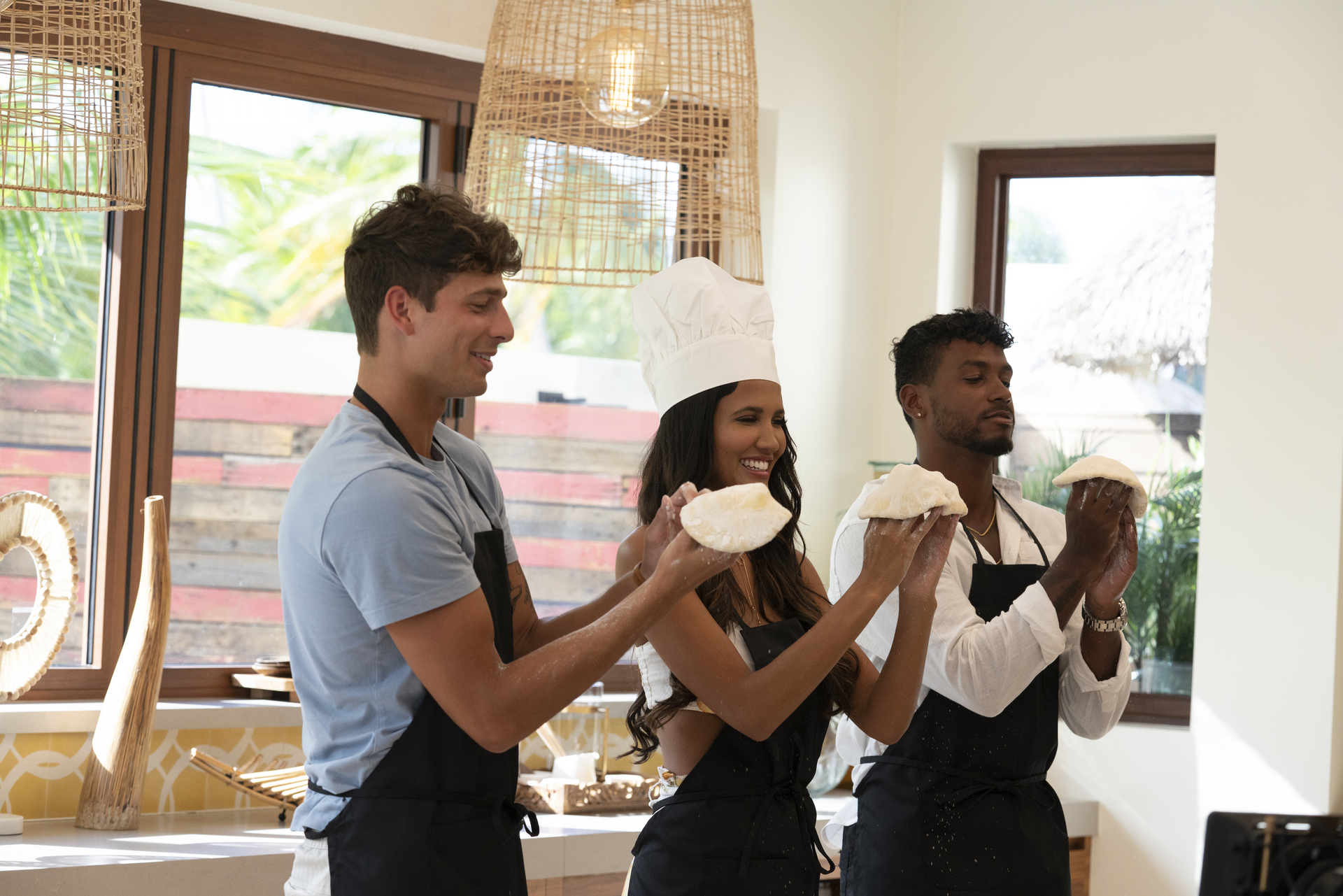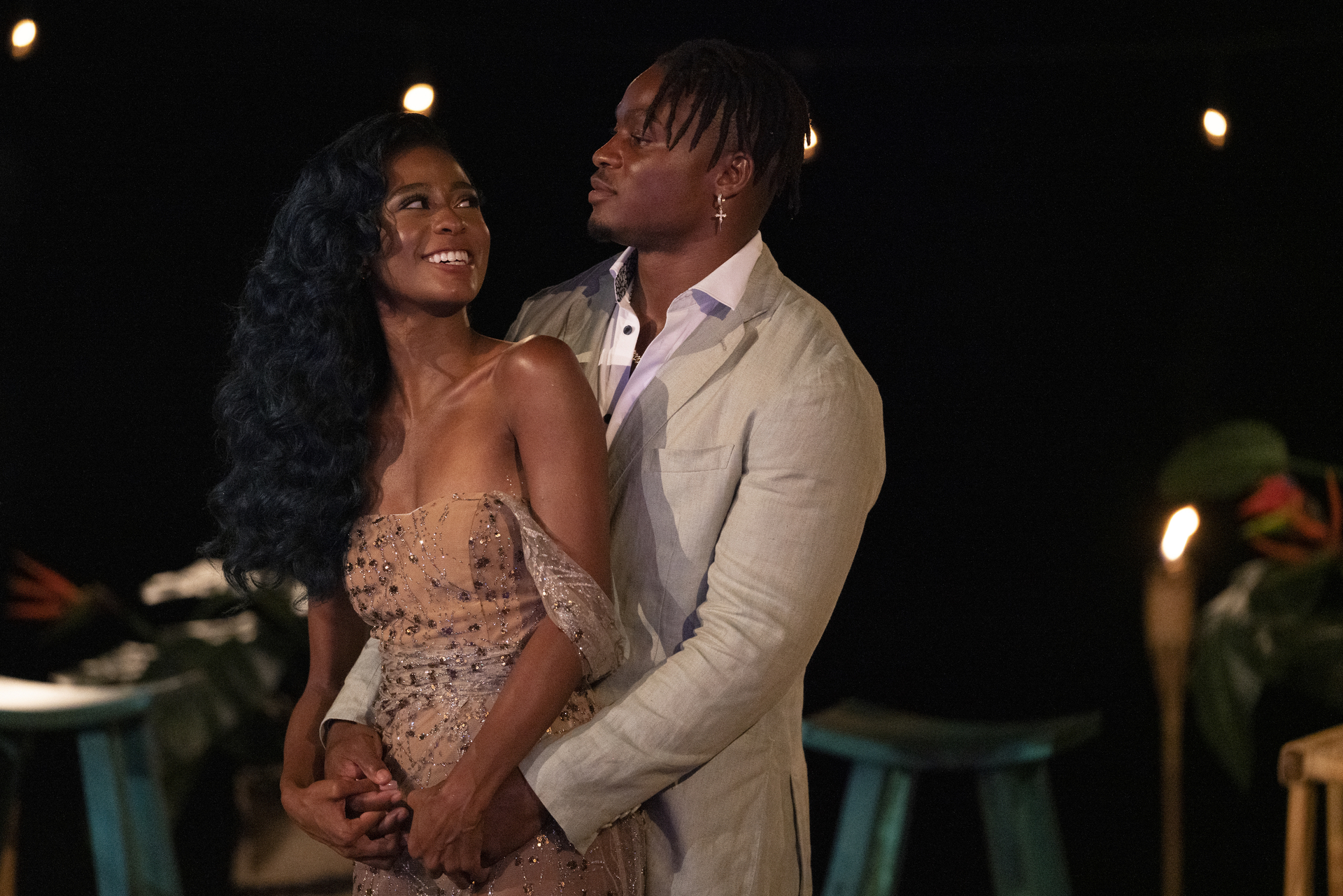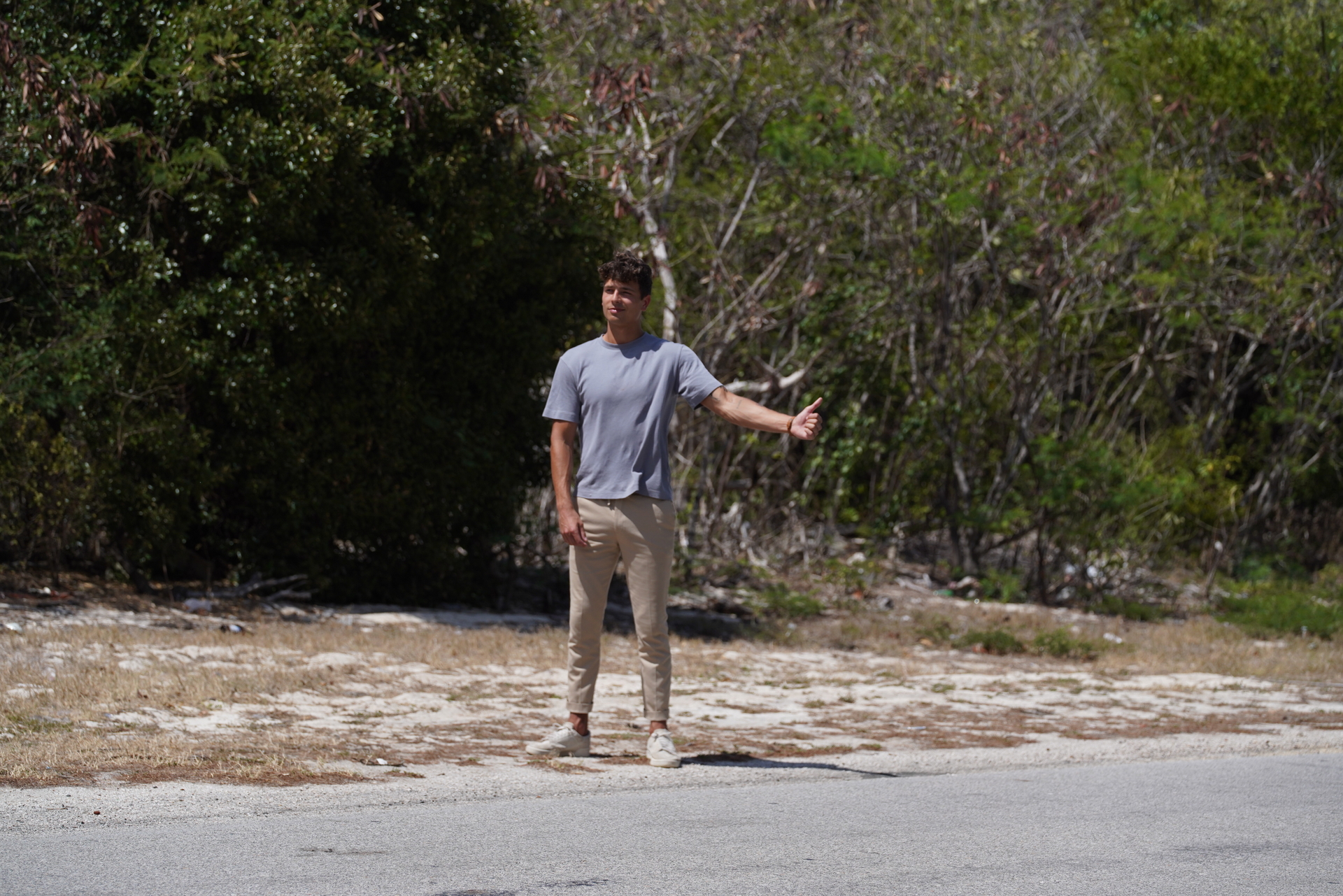This post contains spoilers for FBoy Island.
FBoy Island was far better than it had any right to be. As much a work of satire as a reality TV show, the cheeky reality series begins with three women, stranded on an island of men, half of whom are self-proclaimed “Nice Guys” and the other half of whom are certified “FBoys.” In theory, the women are trying to suss out the good men from the bad ones.
Except, the show is smarter than that makes it sound. And funnier. And, dare we say, more feminist?
The first season was full of twists: Halfway through the series, the producers went ahead and revealed which of the remaining contestants were FBoys, empowering the women to make informed (if not always wise) choices and changing the stakes of the game. One (or more?) of the contestants had girlfriends back home! Casey got eliminated, came back, and got eliminated again! The villainous Garrett didn’t get to keep his prize money!
By the finale, the FBoys had faced retribution. The Nice Guys—well, they did kind of finish last. Two of the three women picked FBoys, and one picked a self-proclaimed Nice Guy who had exhibited some suspicious FBoy behavior earlier in the episode. Two self-proclaimed feminists at TIME were totally addicted to this show and its new twists on a genre bogged down by sexist tropes. Here, we’ll unpack FBoy Island’s gender dynamics, the women’s choices in the finale and whether a certain couple who have the same initials might reunite in the inevitable reunion special.
What do we think of CJ’s (surprising) choice of New Jared over Casey?

Eliana Dockterman: I was very upset by this decision. All three women were more attracted to the FBoys than the Nice Guys—seriously, the Nice Guys were dropping like flies in those first few episodes!—but CJ seemed to be the only one to realize that reforming an FBoy is, if not impossible, a lot of work. She didn’t want to spend the time making Casey a good guy, which is fair enough. Notably, CJ is a few years older than the other women and carried herself as such—she didn’t take any BS from the men, including Casey. (He never actually apologized to her and, inexplicably, remained BFFs with the show’s villain Garrett even after Garrett torpedoed CJ and Casey’s relationship.)
That said, I was rooting for the two CJs to get together. They were the only couple in the group that I felt had genuine chemistry—the kind where you want to hang out with one another because you’re actually friends. Little moments, like CJ coming up to Casey to apologize during his exit interview or the gleeful look on Casey’s face when CJ fetched him from his lonesome cot, suggested that these two people might actually like one another in real life. That’s rare on these shows.
I also am not convinced New Jared is, in fact, a “Nice Guy.” He tried to start fights. The comment he made when Casey came back from CJ’s room was gross and sexist and reeked of slut-shaming. What are the standards by which these men define themselves as “Nice Guys” or “FBoys,” anyway? That possessive dude who kept whispering things in Nakia’s ear in the first episode was also a self-proclaimed nice guy, and he had very creepy vibes. I feel like men who think they’re nice guys but are actually jerks are more dangerous than the self-aware FBoys of the world.
Judy Berman: Yeah, I did not have any particular love for New Jared, and his classification as a Nice Guy mostly just made me wonder what the criteria were. If anything, a dude who is respectful to a woman’s face but turns around and does pathetic, misogynistic locker-room talk behind her back is worse than the standard FBoy.
In any case, I would be very surprised if this couple kept dating off the island… in part because I also didn’t feel like CJ and Casey had gotten each other out of their systems by the end of the finale. I mean, this is one of the great reality-TV couples of all time. He’s an allegedly reformed FBoy, she’s a woman who may be sincerely looking for love but who, let’s face it, also loves to play games. Their chemistry, as you noted, is off the charts. And as contrived as their story line felt at certain points (if you believe he un-eliminated himself without the producers’ help I have a bridge to FBoy Island to sell you), CJ rejecting Casey felt to me like another one of her gambits. There’s no law against them getting back together post-show, and if that happened, she’d go into the relationship with the upper hand—not to mention a whole lot of extra cash.
Read More: FBoy Island and Sexy Beasts Represent the Best and Worst of 2021’s Trashy Summer Dating Shows
What do we think of Nakia’s (totally unsurprising) decision to pick O.G. Jared, even though he’s an FBoy?

JB: First of all, it’s just now occurring to me that two-thirds of the men who “won” FBoy Island are named Jared. Huh. A strong showing for a name that was arguably tarnished by its association with Javanka.
Anyway, I have to say that I never understood what Nakia—who is by all appearances a smart woman and in no way a pushover—saw in O.G. Jared. When they weren’t straight-up arguing, their conversations bored me. He clearly could not control his anger. He seemed more concerned with intimidating the other men than with nurturing a relationship with Nakia. I found it intriguing when she acknowledged, late in the season, that the other cast members probably didn’t understand their connection because they haven’t seen how they’ve opened up to each other in one-on-one dates. But if that happened, viewers didn’t get a chance to witness it, either.
Ultimately, I get the sense that Nakia picked O.G. Jared because she invested so much time in trying to fix him that she never got the chance to seriously pursue anyone else. The sunk cost fallacy in action! I wonder what she would’ve done given the option to pick no one and keep $100k for herself…
ED: I’m shocked the show, for all its professed feminism and wokeness, did not deal with O.G. Jared’s clear anger management problem. He was constantly starting fights and, even in his one-one-one interviews, inexplicably yelling at the camera. To his credit (or perhaps the credit of the producers), he never actually came to blows with the other men. But when Nakia asked him what would happen if she said something that upset him, his lack of response disturbed me. I don’t want to armchair analyze O.G. Jared, but I felt the show failed to address an obvious issue.
Also, I agree that Nakia and O.G. Jared never seemed to have conversations about anything other than Jared’s jealous streak. This, again, is why I grew so attached to CJ and Casey—they actually talked about stuff!
Why, oh why, did Sarah pick Garrett, and how do we feel about the Garrett twist?

JB: This was such a heartbreaker. As far as I could tell, Nice Guy Josh was the catch out of the six finalists. He was gentle, mature, came off as intelligent and secure in his masculinity, didn’t get wrapped up in macho rivalries and, most importantly, he treated Sarah like gold. At one point she expressed some reservations about how much older he was, and I can understand age being a factor. But I do also wish the show would’ve addressed, as Love Is Blind did with so much empathy last year, the challenges of interracial dating in a society still plagued by racism.
That being said, I also think Sarah’s choice speaks to how much easier the FBoys’ paths to the women’s hearts were. Instead of pursuing true compatibility, they simply had to modify their personalities to suit the women they were courting. And Garrett was the FBoy to end all FBoys—a man whose selfish, callous, arrogant, sadistic self-presentation it is taking every ounce of journalistic ethics I possess not to armchair-diagnose in consultation with the DSM-5.
All that to say: I loved how the show dealt with Garrett’s “win.” Reality competitions switch up their rules all the time—thanks in large part to contracts with cast members that grant them an insane amount of freedom to play around—but rarely with the aim of enacting poetic justice. It would’ve been too much to reward Sarah for making an objectively awful choice, so the charity solution was a smart one. (Also: who doesn’t like seeing huge chunks of money go to worthy causes?) Getting to watch Garrett short-circuit at the news that he wasn’t getting any cash after all was a fun bonus.
ED: Josh was absolutely the best guy on the show. In addition to all the wonderful qualities you listed above, he was also one of the only contestants with an actual job. (I will never get over Peter’s career being listed as “Childcare-Slash-Influencer.”) Frankly, I couldn’t understand why Josh was going for Sarah, who I found to be the most boring of the women by far. The fact that she picked Garrett—a man who had been publicly exposed for body-shaming her and coming on the show with a girlfriend back home—was not just unwise but cruel to Josh. Josh deserves better than Sarah.
I also enjoyed Garrett’s comeuppance. I do think it was inevitable. I believe he was the only dude on the show who proclaimed himself an FBoy in his very first one-on-one interview, pre-reveal. It would have been tonally inconsistent to try to “reform” the FBoys who lost in Limbro but hand Garrett a bag of cash. Plus they were always super vague about what was actually going to happen with the money at the end of the show.
I am very curious how they make a second season now that it’s clear FBoys cannot win this game. The producers are going to have to get creative.
Is FBoy Island a feminist show?

ED: FBoy Island was so clearly born from the mind of an ex-Bachelor producer. It delights in upending dating-show tropes and deflating the self-seriousness of the genre. Its feminism is fun, which is not something you can say about really any other reality dating show.
Aside from that extremely confusing moment when the French FBoy denied being an FBoy only to be confronted by footage that proved otherwise, I was pleased that the FBoys gamely played the fools in Limbro, trying to break open coconuts for sustenance. I cackled at the FBoy alerts that went off when men revealed they had jobs back home as club promoters or made a sex joke too early. And I was impressed that the three women were totally supportive of one another and never once fought over a guy, combatting catfight cliches. And bravo to Nakia for abandoning a makeout sesh with O.G. Jared in order to run to CJ’s aid when CJ called out their code word “Pterodactyl!” during a fight with Casey. That’s friendship!
And yet there’s no denying that these three particular women were attracted exclusively to FBoys (or Nice Guys like New Jared who looked like FBoys, talked like FBoys and quacked like FBoys but were, allegedly, not FBoys). Being into mean guys isn’t inherently unfeminist. But it certainly reminds me of those dark, dark days when Tucker Max was offering men tips on how to treat women poorly and thus win them over with jerkiness. The FBoys on the show were at least pretending to be nice. But for a contestant like Nakia, who knowingly chose to court an FBoy, the implied goal was to reform him before the finale. That doesn’t feel like a particularly fair project to lay at Nakia’s feet. Is the magnetism of FBoys supposed to reflect a larger problem with straight women? Why do certain women feel an impulse to reform FBoys—and why does society put the burden on them to do so?
I fully expect a reunion show, and hopefully they’ll unpack some of these issues. Also, I realize “FGirls” aren’t as much a thing as FBoys. But I would absolutely watch FGirl Island.
JB: I have been in the pop-culture feminist trenches for long enough—probably too long, honestly—to know that to proclaim any celebrity or product feminist is to preemptively play yourself. But I do think FBoy Island takes a lot of its cues from the past two decades’ worth of feminist-minded criticism of reality dating series. Glaser and the rest of the production team seemed determined to avoid making the women look stupid or catty. Like you, I was pleased that they were never competing with each other and that they backed each other up. I even thought the framing made it explicit that the nasty comments some of the men made about the women’s appearance or intelligence or sexuality reflected poorly on the former, not the latter.
Limbro was excellent, and I kind of loved how the show made no attempt to justify its obvious artifice. Whether they call themselves influencers or actors or content creators, contestants on a reality competition like this one are there, at least in part, to get their pretty faces and defined abs in front of people who might want to pay them to stand in front of another camera. Of course they took their lumps—and hammed it up for the delightful, tongue-in-cheek “tips” segments.
Another touch I enjoyed was that—with the possible exception of the double-elimination twist that made CJ unwittingly cut Casey—the joke was never really on the women. Even when the men were trying to scam them, the show made that deception as hard as possible. The penultimate episode, in which Glaser hosted a tell-all session with the guys who’d already been eliminated, was particularly thrilling. This is the kind of behind-the-scenes decision that, for me, made it possible to watch FBoy Island without feeling like I belonged in feminist jail. (Fembro?)
As for whether FGirl Island could work… I’m sure there are FGirls out there, just as, of course, there are men who’ve been repeatedly screwed over by women who don’t respect them. But when I start to think about the details—what does a Nice Girl look like? Who hosts? Fembro???—it becomes clear to me that we, as a culture, need to be much further in our journey towards gender equality to support such a spin-off. As goes society, so go the F shows.
More Must-Reads from TIME
- Cybersecurity Experts Are Sounding the Alarm on DOGE
- Meet the 2025 Women of the Year
- The Harsh Truth About Disability Inclusion
- Why Do More Young Adults Have Cancer?
- Colman Domingo Leads With Radical Love
- How to Get Better at Doing Things Alone
- Michelle Zauner Stares Down the Darkness
Write to Eliana Dockterman at eliana.dockterman@time.com